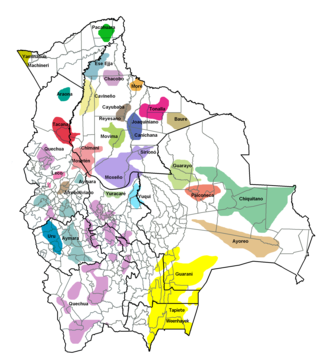Top Qs
Timeline
Chat
Perspective
Movima language
Language isolate of Bolivia From Wikipedia, the free encyclopedia
Remove ads
Movima is a language that is spoken by about 1,400 (nearly half) of the Movima, a group of Native Americans that resides in the Llanos de Moxos region of the Bolivian Amazon, in northeastern Bolivia. It is considered a language isolate, as it has not been proven to be related to any other language.
You can help expand this article with text translated from the corresponding article in Portuguese. (May 2022) Click [show] for important translation instructions.
|
Remove ads
Remove ads
Locations
Movima is spoken in the locations of 18 de Noviembre, 20 de Enero, Bella Flor, Buen Día, Carmen de Iruyañez, Carnavales, Ipimo, Miraflores, Navidad, San Lorenzo, and the town of Santa Ana del Yacuma.[2] The Movima community reported that there are approximately 500 adult speakers as of 2012.[4]: 807
Phonology
Movima has five vowels:
/e/ and /o/ more closely resemble [ɛ] and [ɔ], respectively, than the close-mid vowels [e] and [o]. Vowels have a phonemic length distinction, although some prosodic processes can lengthen otherwise short vowels. Movima does not have tone.[5]
The plosive /p/ is realized as [p] in the syllable onset but as [pʔᵐ] (which contrasts with the simple nasal phoneme /m/) in the coda. Similarly, /t/ and /k/ are realized as [tʔⁿ] and [ʔɤ] (i.e., as a glottal stop with a vocalic release), respectively, in the syllable coda.[1] In vowel-initial words and between adjacent vowels, an epenthetic glottal stop appears.
The phonemes /f/ and /ɡ/ are only present in Spanish loanwords.
Remove ads
Morphology
In Movima, compounding and incorporation are productive derivational processes. Reduplication and affixation, including some processes (such as the irrealis marker (k)a') that resemble infixation, are also common. Typical examples of inflection, such as number, case, tense, mood, and aspect, are not obligatorily marked in Movima.[1] Many derivational processes can be applied to a single Movima word. The same morpheme may appear multiple times in one word this way, for instance, tikoy-na-poj-na "I make X kill Y."
Vocabulary
Loukotka (1968) lists the following basic vocabulary items.[6]
Further vocabulary:
Remove ads
See also
Further reading
- Judy, R. A.; Judy, J. (1962). Movima y castellano. (Vocabularios Bolivianos, 1). Vocabularios Bolivianos. Cochabamba: Summer Institute of Linguistics.
References
External links
Wikiwand - on
Seamless Wikipedia browsing. On steroids.
Remove ads

